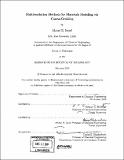Multiresolution methods for materials modeling via coarse-graining
Author(s)
Ismail, Ahmed E. (Ahmed Emad), 1977-
DownloadFull printable version (10.77Mb)
Other Contributors
Massachusetts Institute of Technology. Dept. of Chemical Engineering.
Advisor
Gregory C. Rutledge and George Stephanopoulos.
Terms of use
Metadata
Show full item recordAbstract
(cont.) time, while obtaining useful information about the thermodynamic behavior of the system. We show how statistical mechanics can be formulated using the wavelet transform as a coarse-graining technique. For small systems in which exact enumerations of all states is possible, we illustrate how the method recovers reasonably good estimates for physical properties (errors no more than 10%) with several orders of magnitude fewer operations than are required for an exact enumeration. In addition, we illustrate that errors introduced by the wavelet transform vanish in the neighborhood of fixed points of systems as determined by RG theory. Using scaling results from simulations at different length scales, we estimate the thermodynamic behavior of the original system without performing simulations on the full original system. In addition, we make the method adaptive by using fluctuation properties of the system to set criteria under which further coarse graining or refinement of the system is required. We demonstrate our method for the Ising universality class of problems. We also examine the applicability of the WAMC framework to polymer chains. Polymers are quintessential examples of the need for simulations at multiple scales: at one end, we can study short chains using quantum chemistry methods; yet polymers can have relaxation times on the order of seconds or longer, and molecular weights of 10⁶ or more. Even with modern computational resources, simulating behavior at long times or for long chains is still prohibitively expensive ... Multiscale modeling of physical systems often requires the use of multiple types of simulations to bridge the various length scales that. need to be considered: for example, a density-functional theory at the electronic scale will be combined with a molecular-dynamics simulation at the atomistic level, and with a finite-element method at the macroscopic level. An improvement to this scheme would be a method which is capable of consistently simulating a system at multiple levels of resolution without passing from one simulation type to another, so that different simulations can be studied at a common length scale by appropriate coarse-graining or refinement of a given model. We introduce the wavelet transform as the basis for a new coarse-graining framework. A family of orthonormal basis, the wavelet transform separates data sets, such as spatial coordinates or signal strengths, into subsets representing local averages and local differences. The wavelet transform has several desirable properties for coarse-graining: it is hierarchical, compact, and has natural applications to approximating physical data sets. As a hierarchical method, it can be used to rescale a Hamiltonian to a desired length scale, and at the same time also rescales the particles of the system by creating "blocked" particles in the spirit of renor-malization group (RG) calculations. The wavelet-accelerated Monte Carlo (WAMC) framework performs a Monte Carlo simulations on a small system which will be transformed into a block particle to obtain the probability distribution of the blocked particle; a Monte Carlo simulation is then performed on the resulting system of blocked particles. This method, which can be repeated as needed, can achieve significant speed-ups in computational
Description
Thesis (Ph. D.)--Massachusetts Institute of Technology, Dept. of Chemical Engineering, 2005. Includes bibliographical references (p. 209-222).
Date issued
2005Department
Massachusetts Institute of Technology. Department of Chemical EngineeringPublisher
Massachusetts Institute of Technology
Keywords
Chemical Engineering.